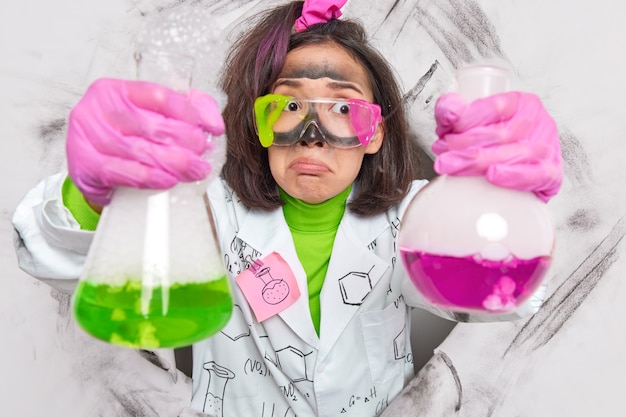Discover Fascinating Facts about Chlorine

Chlorine is a chemical element with the symbol Cl and atomic number
2. Chlorine is a yellow-green gas at room temperature.
Chlorine is highly reactive and can form compounds with almost all other elements.
Chlorine is essential for maintaining clean and safe water in swimming pools.
Chlorine was first discovered and named by Swedish chemist Carl Wilhelm Scheele in 1774.
Chlorine is found in nature primarily as a compound called sodium chloride, or table salt.
Chlorine is used in the production of PVC, plastics, and bleach.
Chlorine gas was used as a chemical weapon in World War I.
Chlorine has a strong odor that is often associated with swimming pools.
Chlorine is toxic and can be harmful to human health if inhaled or ingested in large quantities.
Chlorine is used as a disinfectant in many industries, including healthcare and water treatment.
Chlorine is used to kill bacteria and other microorganisms in drinking water.
Chlorine gas reacts with water to form hydrochloric acid and hypochlorous acid, which are powerful disinfectants.
Chlorine is an essential nutrient for plants and is used in fertilizers.
Chlorine bleach is commonly used for laundry and cleaning purposes.
Chlorine is used in the production of paper and pulp.
Chlorine is one of the most widely produced industrial chemicals globally.
Chlorine gas is denser than air and can rapidly displace oxygen in confined spaces, leading to asphyxiation.
Discover Fascinating Facts about Chlorine part 2
Chlorine can react with organic matter to form harmful byproducts, such as trihalomethanes, in drinking water.
Chlorine has a strong corrosive effect on metals and can cause damage to infrastructure if not handled properly.
Chlorine is crucial in the production of chlorofluorocarbons (CFCs), which were once widely used as refrigerants but have been phased out due to their harmful effects on the ozone layer.
Chlorine has been used historically as a bleach for textiles and as a disinfectant in hospitals.
Chlorine gas is heavier than air and tends to collect in low-lying areas, posing a significant risk in industrial accidents or leaks.
Chlorine is commonly used to sanitize swimming pools and prevent the growth of harmful bacteria, viruses, and algae.
Chlorine gas is highly toxic and can cause severe respiratory damage if inhaled.
Chlorine is an important element for the production of medicines, such as antibiotics and painkillers.
Chlorine is a powerful oxidizing agent and can react with a wide range of substances.
Chlorine has a bleaching effect on many colored compounds, making it useful in the textile and paper industries.
Chlorine is heavier than air and can accumulate in confined spaces, posing a risk of chemical suffocation.
Chlorine gas can react explosively with flammable substances, making it highly dangerous in certain situations.
Chlorine is used in the production of dyes, solvents, and pharmaceuticals.
Chlorine gas has a distinct odor that is often associated with cleaning products.
Chlorine is a key element in the production of polyvinyl chloride (PVC) plastics.
Chlorine is highly reactive with several metals, including sodium, potassium, and magnesium.
Chlorine is a powerful oxidizing agent and can react with organic compounds to form chlorinated byproducts, some of which are carcinogenic.
Chlorine gas can cause severe burns if it comes into contact with the skin or eyes.
Chlorine is used in the purification of drinking water to kill harmful bacteria and prevent waterborne diseases.
Chlorine gas was first used as a chemical weapon during World War I, causing thousands of casualties.
Chlorine is present in the Earth’s atmosphere in trace amounts and plays a role in the depletion of the ozone layer.
Chlorine gas can cause respiratory irritation and damage to the lungs if inhaled.
Chlorine is an important element for the production of pharmaceuticals and medical supplies.
Chlorine is used in the production of vinyl, a widely used material in construction and manufacturing.
Chlorine can react with organic compounds to form chloramines, which can cause eye and respiratory irritation.
Chlorine has been used as a disinfectant in public swimming pools since the early 20th century.
Chlorine is essential for maintaining clean and safe water supplies, but its use must be carefully regulated to prevent harmful effects on human health and the environment.

